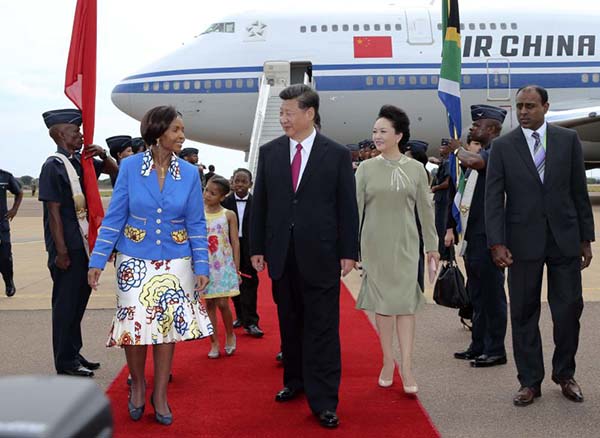
Chinese President Xi Jinping (2nd L, front) and his wife Peng Liyuan (2nd R, front) are welcomed by South Africa's International Relations and Cooperation Minister Maite Nkoana-Mashabane upon their arrival in Pretoria, South Africa, Dec 2, 2015. Xi arrived here on Wednesday for a state visit to South Africa. (Photo/Xinhua)
China has always regarded Africa as a place of opportunity rather than a source of problems. It has courted African governments as political allies since the foundation of the People's Republic. Unlike the West whose aid was centered on technical and financial assistance, China uses a different approach. [Special coverage]
China has been eager to use infrastructure projects to facilitate connectivity between the landlocked countries and coastal areas in Africa, with the aim of fostering the same kind of local and regional economic development that China has seen since the 1980s. And now that its economic growth has slowed, China needs to seek new overseas markets and consumers. With its foreign exchange reserves of $3.65 trillion, China has led the establishment of a number of financial institutions such as the Silk Road Fund, the BRICS New Development Bank and the Asian Infrastructure Investment Bank to finance these infrastructure projects.
China's focus on the 21st Century Maritime Silk Road for infrastructure development is also a response to its severe overcapacity in the construction and manufacturing sectors. According to the State Council, China's Cabinet, Africa is already China's second-largest overseas construction site. Under the new Maritime Silk Road project, China will leverage its comparative advantage in construction and material surplus, and allow more State-owned enterprises to go global.
One of China's major interests is to expand its trade with Africa and consolidate its position as one of Africa's strategic trading partners. In 2009, China overtook the United States as Africa's largest trading partner, and the China-Africa trade volume reached a record $200 billion in 2013.
With its domestic market shrinking because of demographic trends and the ever-maturing Western markets, China is keen to tap into Africa's burgeoning consumer markets. According to McKinsey, Africa will account for one-fifth of the global population by 2025, more Africans will emerge out of poverty and almost "two-thirds of the estimated 303 million African households will have discretionary income". The connectivity by road, rail, waterways and air, as well as digital links will also accelerate industrial efficiency and productivity. They will also identify new market opportunities for China's rising brands such as Haier and Huawei in Africa.
But what will make the 21st Century Maritime Silk Road initiative a success in Africa?
First, the most important precondition for the success of the 21st Century Maritime Silk Road is mutual confidence. Though China's involvement in Africa has benefited from the historical goodwill, it has been subject to growing scrutiny in recent years both in the region and globally. So China has to build mutual confidence with African countries.
Second, Chinese companies need to be better prepared when investing abroad. China's strategy of "going global" has received mixed reception from African partners. This is especially true for large-scale SOEs, which often face difficulties in adjusting to the different political, cultural, financial and legal frameworks in Africa.
Third, since the new Maritime Silk Road is still a project in the making, transparency and coordination between China and African countries are vital.
Fourth, as China also has strategic interests in several African countries, careful coordination will be needed to reduce misunderstandings and internal rivalry in Africa. To ensure effective coordination and transparency it is important to establish a multi-national coordinating body including stakeholders from all participating countries. This approach will help create the necessary degree of transparency and trust which will be essential in engaging with China in the framework of the new Maritime Silk Road.
Fifth, people-to-people exchanges between China and Africa should be strengthened. Historical legacies and goodwill based on experience will gradually fade away. And as the exchange of students is more of a one-way traffic from Africa to China now, Chinese policymakers should encourage more young Chinese people to study in African countries, in order to better understand Africa, its history, languages, religions and societies.
Frannie A. Léautier is chairperson and co-founding partner of Mkoba Private Equity Fund & former vice-president of the World Bank, Michael Schaefer is chairman of the board of BMW Foundation & former German ambassador to China, and Wei Shen is a professor of international business and director of Confucius Institute at Lancaster University & Jean Monnet chair of EU-China relations.


















































